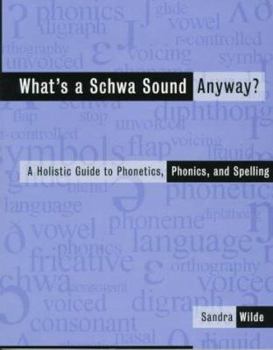What's a Schwa Sound Anyway?: A Holistic Guide to Phonetics, Phonics, and Spelling
To many teachers who began their careers with basal readers, the schwa sound was part of what led them to whole language in the first place. If they didn't even understand linguistic terminology themselves, how could they be expected to teach it to kids? Yet many teachers still wonder about letters and sounds and phonics. What role does phonics play in learning to read? Does it still have a place in classrooms where children are becoming literate through rich experiences with literature and writing? Why have the debates about phonics continued and in some ways grown more heated? In What's a Schwa Sound Anyway? Sandra Wilde answers these and many other questions related to phonics and its relationship to learning to read and spell. She makes a forceful case that teachers who have a working knowledge about the English sound system are not only more powerful observers of students' reading and invented spelling, but also more informed participants in the current debates about the role of phonics in learning to read. The first part of the book is a lively exploration of the English sound system and its relation to written language for both reading and spelling. This mini-course in linguistics is reader friendly and accessible to even the most linguistics-phobic classroom teacher. Of special interest to those who work with diverse populations is a chapter-length discussion of language variation such as Black English and its role in learning to read and spell. The second part of the book helps readers apply their new knowledge about sounds, letters, and the relationship between them to the classroom. Chapter 5, "Skills and the Big Phonics Debate," applies theory, research, and common sense to debates about the role of phonics in learning to read and spell. The next two chapters take a close look at a number of writing samples and reading miscues, illuminating how a knowledgeable teacher can appreciate "error" as a reflection of children's developing understandings of written language. Sandra Wilde's work with invented spelling has helped us discover that the better we understand what children are doing, the more responsive and creative we can be as teachers. What's a Schwa Sound Anyway? continues this work by helping teachers deepen and extend their knowledge base about written language and the way children perceive it, always with the goal of helping children continue to grow and develop as readers and writers.
Format:Paperback
Language:English
ISBN:0435088653
ISBN13:9780435088651
Release Date:April 1997
Publisher:Heinemann Educational Books
Length:155 Pages
Weight:0.70 lbs.
Dimensions:0.4" x 7.4" x 9.3"
Age Range:13 years and up
Grade Range:Grade 8
Customer Reviews
2 ratings
Teacher's Perspective
Published by Thriftbooks.com User , 24 years ago
This book cuts to the chase and provides an understandable overview of linguistics and phonics. It speaks clearly to implications for writing, spelling and reading instruction, but does so in a very teacher friendly way.
Not just for teachers
Published by Thriftbooks.com User , 25 years ago
I'm not a teacher, but I enjoyed this very readable introduction to linguistics and how we learn to read, spell, and pronouce words. Why are some words hard to spell correctly? What are the best ways for kids - and adults - to figure out unfamiliar words? Sandra Wilde answers these questions and more in this entertaining and informative book.





